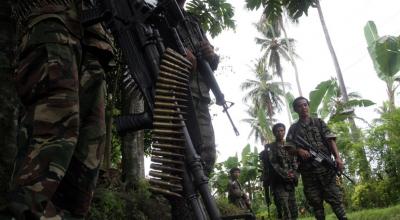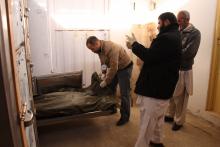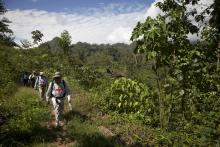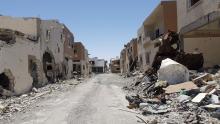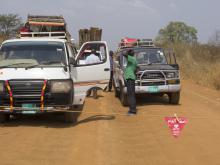Case prepared by Jennifer Hickey and Nicole Schladt, J.D. students at Emory University School of Law, under the supervision of Professor Laurie Blank, Emory University School of Law; with the contribution of Jemma Arman and Isabelle Gallino, LL.M. students at the Geneva Academy.
A. DEED OF COMMITMENT UNDER GENEVA CALL FOR ADHERENCE TO A TOTAL BAN ON ANTI-PERSONNEL MINES AND FOR COOPERATION IN MINE ACTION
WE, the MORO ISLAMIC LIBERATION FRONT (MILF), through our duly authorized representative(s), as a non-state actor,
[...]
NOW, THEREFORE, hereby solemnly commit ourselves to the following terms:
1. TO ADHERE to a total ban on anti-personnel mines. By anti-personnel mines, we refer to those devices which effectively explode by the presence, proximity or contact of a person, including other victim-activated explosive devices and anti-vehicle mines with the same effect whether with or without anti-handling devices. By total ban, we refer to a complete prohibition on all use, development, production, acquisition, stockpiling, retention, and transfer of such mines, under any circumstances. This includes an undertaking on the destruction of all such mines.
2. TO COOPERATE IN AND UNDERTAKE stockpile destruction, mine clearance, victim assistance, mine awareness, and various other forms of mine action, especially where these programs are being implemented by independent international and national organisations.
3. TO ALLOW AND COOPERATE in the monitoring and verification of our commitment to a total ban on anti-personnel mines by Geneva Call and other independent international and national organisations associated for this purpose with Geneva Call. Such monitoring and verification include visits and inspections in all areas where anti-personnel mines may be present, and the provision of the necessary information and reports, as may be required for such purposes in the spirit of transparency and accountability.
4. TO ISSUE the necessary orders and directives to our commanders and fighters for the implementation and enforcement of our commitment under the foregoing paragraphs, including measures for information dissemination and training, as well as disciplinary sanctions in case of non-compliance.
5. TO TREAT this commitment as one step or part of a broader commitment in principle to the ideal of humanitarian norms, particularly of international humanitarian law and human rights, and to contribute to their respect in field practice as well as to the further development of humanitarian norms for armed conflicts. [...]
Done this 7th day of April, 2002 in Maguindanao, Philippines.
For the MORO ISLAMIC LIBERATION FRONT (MILF) [...]
B. ENGAGING WITH PHILIPPINE ARMED GROUPS
[...]
[Geneva Call] has engaged with the MILF and its armed wing, the Bangsamoro Islamic Armed Forces (BIAF) and other stakeholders for the past six years to provide a mechanism for the MILF-BIAF to support humanitarian laws. Armed groups are automatically excluded from signing international treaties prescribing humanitarian norms. [...]
Geneva Call's engagements with armed groups have strategic, long-term objectives relating to policy and practice, rather than focusing on more immediate problems like securing access to assist vulnerable populations, as is the case with many humanitarian actors. [...]
A document by Geneva Call to provide a format for armed groups to subscribe to humanitarian norms was first devised for anti-personnel mine usage. The MILF signed the Deed of Commitment for Adherence to a Total Ban on Anti-Personnel Mines and for Cooperation in Mine Action in 2000, during an upsurge in the conflict.
Much of the nationalist struggle took place in the Bangsamoro homeland. Because landmines harm indiscriminately and remain lethal after peace agreements are signed, the MILF-BIAF favoured a ban on anti-personnel mines, but prior to the Deed of Commitment there were no available mechanisms to formalise it, Rush said. [...]
Humanitarian norms
Jesus Domingo, of the government's foreign affairs department, told IRIN he became involved in the MILF commitment not to use anti-personnel mines through the department’s work in humanitarian affairs and disarmament in 2007. "The process was very much between MI [a shorthand for MILF] and Geneva Call, but we encouraged it and applauded it, as we welcome armed non-state actors embracing IHL and other international norms."
The government assented and then stood back. "We respected their [Geneva Call’s] independence... and for them to be successful they must have the confidence of not only us, but also of MI," Domingo said. The MILF signing the Deed "was a plus”, and “[i]t certainly contributed to the building of confidence… Geneva Call were not directly part of the peace process, but we saw them as part of the overall spectrum."
[...] During the early stages of the struggle we were using anti-personnel mines as a defence for our camps,” Murad Ebrahim noted. “There are those commanders who said we did not need to sign this commitment but, ultimately, if we continued to use landmines, our people suffer."
He said the 2001 Tripoli agreement between the MILF and the government to resume peace talks, which included provisions for the respect of human rights and IHL, and a commitment not to use anti-personnel mines, "gave us the image of having respect for international law". [...]
A 2008 peace agreement gave the MILF control over more than 700 areas in the south that they considered their ancestral domain, but this was ruled unconstitutional by the Supreme Court and hostilities resumed. In the course of the fighting the Philippines government accused the BIAF of using anti-personnel mines and Geneva Call launched a verification mission.
Verification
In 2009 Geneva Call concluded that some of the explosive devices used against the Armed Forces of the Philippines (AFP) were activated by remote control and therefore not prohibited under the Deed's provisions. Others may have been victim-activated - set-off by trip wires or by downward pressure and therefore be in violation of the Deed - but there was not enough evidence to attribute responsibility. "The military would have liked more definitive conclusions," Domingo commented.
"It was not possible to definitively conclude that its forces had no involvement in the incidents, so it was not a zero-sum game"
Rush noted that "Although perhaps not completely satisfied, the government did accept the findings… [but] the MILF were also a little disappointed that it was not possible to definitively conclude that its forces had no involvement in the incidents, so it was not a zero-sum game."
The verification report showed that disavowing anti-personnel landmine use was just a first step towards the "actualization of obligations", and armed groups sometimes needed assistance to achieve this. "So they [MILF-BIAF] drafted General Order Number 3, and we assisted… [with] advice and through working with them and our local partner, the Institute of Bangsamoro Studies, to disseminate the Order to their forces on the ground," Rush said.
Domingo said the Order was seen as "a real earnest effort by MILF to educate its combatants about not using landmines", and added to "the very upbeat" feeling the government has about the Bangsamoro peace process.
C. BIFF TO TAKE MILF AS AN EXAMPLE ON NON-USAGE OF ANTI-PERSONNEL LANDMINES
[Source: “A Public Statement by the Philippine Campaign to Ban Landmines and the Swiss Foundation for Mine Action (FSD)”, 3 March 2016, Office for the Presidential Advisor on the Peace Process, available on: Link not available.]
The Philippine Campaign to Ban Landmines (PCBL) and its international partner, the Swiss Foundation for Mine Action (FSD) express grave concern and strongly condemn the recent use of victim-activated improvised explosive devices (IEDs) by the armed group Bangsamoro Islamic Freedom Fighters (BIFF) particularly in Barangay Tee in Datu Salibu Municipality in the province of Maguindanao. Victim-activated IEDs have the same function and effects as the globally banned anti-personnel landmines and violate international humanitarian law. These indiscriminate weapons do not distinguish between combatants and civilians. Even a child could trigger such devices to explode.
The BIFF can take heed from the Moro Islamic Liberation Front (MILF) who unilaterally declared in 2000 as an official policy that they will not use anti-personnel landmines and victim-activated improvised explosives in their armed struggle. The MILF views the use of these weapons as against the teachings of Islam. This crucial decision by the MILF has saved countless of innocent lives and altered the future of the Bangsamoro for the better, and has helped to avoid the challenges of unusable land littered with explosives and landmines which continue to claim innocent lives in neighboring countries such as Cambodia, Laos, Myanmar, Thailand and Vietnam.
PCBL and FSD strongly remind all parties to the armed conflict that wars have limits and to respect international humanitarian law.
Discussion
I. Classification of the Situation and Applicable Law
1. How would you classify the situation between the MILF and the government of the Philippines? Does it amount to an armed conflict? What further information would you need to make such a determination? When does a non-international armed conflict end? Can a non-international armed conflict be considered to have ended prior to the signing of a peace agreement? (
GC I-IV, Art. 3)
II. Anti-Personnel Mines
3. Are anti-personnel mines
per se unlawful under IHL? In what circumstances would the use of anti-personnel mines constitute an unlawful method of warfare? (
P I, Arts 35,
51;
CIHL, Rules 1,
11,
12,
70 and
71).
4. What does customary law prescribe about the usage of anti-personnel mines? (
CIHL, Rules 81,
82 and
83)
III. Elements Contributing to Respect for IHL
6. Why do you think Geneva Call encourages non-state actors to enter into Deeds of Commitment on issues related to the conduct of hostilities? Can non-state actors become a party to the Geneva Conventions or other international treaties? Are they otherwise bound by IHL? Why?
7. What is the legal value of the Deed of Commitment? Are armed groups legally bound by it? Why?
8. What might motivate a non-state armed group to commit to a prohibition on anti-personnel mines? Why do anti-personnel mines have such long lasting impacts on communities?
9. What effect, if any, do you think the signing of the Deed of Commitment had on the peace process between the MILF and the Government of the Philippines? According to Document B, how did the government view the MILF’s commitment?
10. Can international intergovernmental or non-governmental organisations assist non-state armed groups to commit to humanitarian agreements? How? What are the advantages and disadvantages of each category of organisations in fulfilling this task? Why is the neutrality of the organisation so important in the performance of these tasks?
11. What can be the consequences of a violation of the Deed of Commitment? Could there be penal prosecutions for such violations? By whom?
12. Considering Document C, how might the commitments of one non-state armed group affect other groups operating in the same area?

